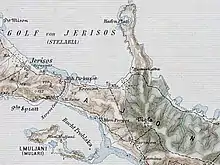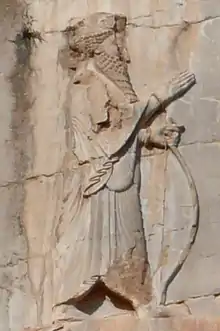کانال خشایارشا
کانال خشایارشا (یونانی:Διώρυγα του Ξέρξη) نام کانالی قابل کشتیرانی در پایهٔ کوه آتوس در خالکیدیکه در شمال یونان است. این کانال به فرمان خشایارشا در سدهٔ ۵ پیش از میلاد ساخته شد و از معدود آثار ایرانی باقی مانده در اروپا است.[1]

مکان
این کانال در نزدیکی روستای نیا رودا در شبه جزیرهٔ آتوس قرار دارد. از شرق روستا شروع میشود و تا غرب روستای تریپیتی ادامه میباشد.
تاریخچه
طبق نوشتههای تاریخنگار یونانی هرودوت، در خلال جنگهای ایران و یونان در سال ۴۹۲ پیش از میلاد هنگام نخستین تهاجم ایرانیان به یونان سردار ایرانی مردونیه بخش بزرگی از سپاهش شامل ۳۰۰ کشتی جنگی و ۲۰٬۰۰۰ مرد جنگی را بر اثر طوفانی در شبه جزیرهٔ آتوس از دست داد.[2]
در ۴۸۳ پیش از میلاد، خشایارشا که برای دومین تهاجم ایرانیان به یونان آماده میشد، دستور ساخت کانالی در شبه جزیره آتوس به منظور پیش گیری از رخ دادن حوادث مشابه را داد.[3] هرودوت گمان میکند که این افتخار برای روحیه دادن به سربازان هم بودهاست.[4]
این کار توسط دو مهندس ایرانی آرتاخه و بوبراندا بودند. کار ساخت این کانال ۳ سال و به طول انجامید. در ساخت این کانال از کارگران محلی استخدام شده بودند همچنین مصریان و فنیقیها استفاده شد.[5] بنا به گفتهٔ هرودوت، طول کانال ۱۲ استادیا بود[3] و از هر دو طرف توسط جویهایی محدود شده بود. این کانال پس از مدتی به علت بی استفاده بودن پس از نبردهای آرتمیزیوم و سالامیس نیازمند تعمیرات گشت. توسیدید ۸۰ سال بعد یعنی در سال ۴۰۰ پیش از میلاد از این کانال گذشت و از آن در کتاب تاریخ جنگهای پلوپونزی یادکرد.[2]
جستارهای وابسته
پانویس
- B. S. J. Isserlin, R. E. Jones, V. Karastathis, S. P. Papamarinopoulos, G. E. Syrides and J. Uren "The Canal of Xerxes: Summary of Investigations 1991-2001" The Annual of the British School at Athens Vol. 98 (2003), pp. 369-385 http://www.jstor.org/stable/30073214
- Herodotus VI, 44
- Herodotus VII, 22
- Herodotus VII, 24
- Herodotus VII, 23-25
منابع
منابع باستانی
منابع نوین
- B. S. J. Isserlin, R. E. Jones, V. Karastathis, S. P. Papamarinopoulos, G. E. Syrides and J. Uren "The Canal of Xerxes: Summary of Investigations 1991-2001" The Annual of the British School at Athens Vol. 98 (2003), pp. 369–385 http://www.jstor.org/stable/30073214
- B. S. J. Isserlin: The Canal of Xerxes: facts and problems. Annual of the British School at Athens 86 (1991), 83–91.
- B. S. J. Isserlin, R. E. Jones, S. P. Papamarinopoulos, J. Uren: The Canal of Xerxes: preliminary investigations in 1991 and 1992. Annual of the British School at Athens 89 (1994), 277–284.
- B. S. J. Isserlin, R. E. Jones, S. P. Papamarinopoulos, G. E. Syrides, Y. Maniatis, Y. Facorellis, J. Uren: The Canal of Xerxes: investigations in 1993–1994. Annual of the British School at Athens 91 (1996), 329–340.
- B. S. J. Isserlin, R. E. Jones, V. Karastathis, S. P. Papamarinopoulos, G. E. Syrides and J. Uren "The Canal of Xerxes: Summary of Investigations 1991-2001" The Annual of the British School at Athens Vol. 98 (2003), pp. 369–385 http://www.jstor.org/stable/30073214
- R. E. Jones, B. S. J. Isserlin, V. K. Karastathis, S. P. Papamarinopoulos, G. E. Syrides, J. Uren, I. Balatsas, Ch. Kapopoulos, Y. Maniatis, Y. Facorellis: Exploration of the Canal of Xerxes, Northern Greece: the role of geophysical and other techniques. Archaeological Prospection 7 (2000), 147–170 (Abstract).
- V. K. Karastathis, S. P. Papamarinopoulos: Preliminary results of the implementation of the shallow seismic techniques in order to detect the King Xerxes' Canal. Extended Abstract. Newsletter (European Geophysical Society) 53 (1994), 8–9.
- V. K. Karastathis, S. P. Papamarinopoulos: The detection of the Xerxes Canal by the use of shallow reflection and refraction seismics - preliminary results. Geophysical Prospecting 45 (1997), 389–401 (Abstract).
- V. K. Karastathis, S. P. Papamarinopoulos, R. E. Jones: 2-D Velocity Structure of the Buried Ancient Canal of Xerxes: An Application of Seismic Methods in Archaeology. Journal of Applied Geophysics 47 (2001), 29–43.
- Y. Bhattacharjee: Persian Canal Discovery Is Testament to Ancient Engineering Skills. New York Times, 13. نوامبر ۲۰۰۱ (Text).

